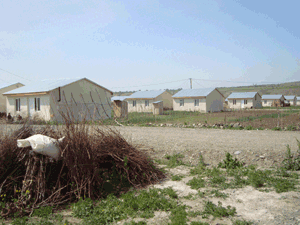Tea Tedliashvili, Gori
 Grass started to grow up in the cottages which were declared comfortable by the government; by the way, construction of each cottage cost 27 000 USD. IDPs, living in the settlements in the village of Skra, Gori district, have to fight snakes, lizards and ground squirrel everyday; in addition to that, every morning when they get up they find grass grown out in their rooms.
Grass started to grow up in the cottages which were declared comfortable by the government; by the way, construction of each cottage cost 27 000 USD. IDPs, living in the settlements in the village of Skra, Gori district, have to fight snakes, lizards and ground squirrel everyday; in addition to that, every morning when they get up they find grass grown out in their rooms.
IDP Tengiz Basishvili looks after the grass in the cottage and jokes: “When it is high enough I will mow it.” The lines of cottages look terrible outside but now they have horrible interior as well. The cottages were built in two months and wet wood was used for the construction; consequently, the boards of the floor are far from each other with ten-centimeter. Besides that the cottages are constructed on the surface of ground and it is not strange that grass started to grow up in the rooms. Nothing blocks raptiles and grass to come out in the wide holes in the houses.
The IDPs settled in the cottages in the village of Skra on December 1, 2008. The walls also have separated from each other and nobody will be surprised if in a year the houses will pull down. The ceilings of “comfortable” houses are made of veneer.
After the rain leaked into the house, Tengiz Basishvili, an IDP from the village of Kurta, had to climb up into the attack to cut a hole in the ceiling; unfortunately he could not get into the attack because the veneer is too weak for the weight of a man; particularly when it is wet with rain.
“We have grass in the rooms; so many ants attack us that we cannot fight with them. The snake is crawling in the yard freely and we do not know how to resolve the problem. One snake was killed yesterday. Not a single official has come here and asked us if we can live in these cottages which are already falling apart. I requested to construct a cattle-shed in front of the house but they refused. I bought pigs with the money NGOs had given to us and now I have to build a shed for them in the yard. What shall I do? Family in village should have domestic animals. Representatives of the NGO visited us and promised to buy cows for us; we signed some documents but nobody has bought anything. Then the same person arrived in our settlement and categorically refused that they had promised us to buy cows,” said Tengiz Basishvili.
“We were given plots. They planted corns in the land of 15 hectares but I do not know how much corn will be apportioned for each family when the harvest is taken. Although we have plots, there is no water to irrigate them. We manage to water the plots in our own yards but we cannot water fruit-gardens. Now I am digging out a well in the yard in order to irrigate the plots near the settlement,” said Gocha Kakhniashvili, an IDP living in Skra.
Administration of Shida Kartli region did not have information about the problem before we met them. They knew that IDPs living in Tserovani had problems with snakes and other reptiles but had no idea about the same problem in Skra. However, several minutes later Natia Omadze, head of press-service at the regional administration, found out that “the administration had already informed the Ministry of Agriculture about the problem and requested them to resolve the problem since it was within the competence of the Ministry.”
Giorgi Chaduneli, head of public relation department at the Ministry of Agriculture, got surprised at hearing the information from us. They tried to find out whether the regional administration of Shida Kartli had really sent the information about the problem for forty minutes. However, on the previous day Chaduneli told journalist Saba Tsitsikashvili that “local authorities are entitled to resolve the problems about snakes and other reptiles. The Ministry of Agriculture does not implement similar activities.”
The Human Rights Center was informed that a child, Mariam Shermadini, who was attacked by the snake and turned dumb. Gela Chulukhadze, head of the hospital in Tserovani settlement, stated that after the child and the parent were attacked by the snake the doctors gave sedative medicines to them and patients went home. Gela Chulukhadze added that later the child was taken to Tbilisi; father told the neighbors that the child went dumb. The hospital in the settlement does not have any more information.



